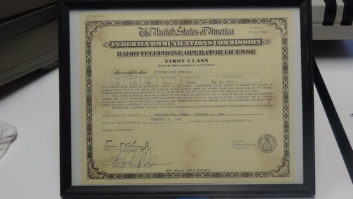Central Florida Educational Foundation wants the Federal Communications Commission to change the cities of license of two of its FM stations. But the FCC is going to need further convincing.
CFEF does not propose to move either transmitter; its aim apparently is to associate the stations with larger communities. But the FCC sent its requests back, saying they don’t comply with its policies. It gave the foundation 30 days to amend the applications.
The details
The foundation made its requests under FCC rules that lay out requirements for a broadcaster to specify a new community of license without providing an opportunity for “competing expressions of interest” — in other words, without opening itself up to competition for its existing spot on the dial.
Among other things, an applicant must show that the proposed change constitutes a “preferential arrangement of allotments” under FCC policies.
The case also involves policies set out in the 2011 “Rural Radio” order (known in full as “Policies to Promote Rural Radio Service and to Streamline Allotment and Assignment Procedures”).
Among other things, that order established an “urbanized area service presumption,” or UASP, defined as a presumption that, when the community proposed is in an urbanized area or could, through a minor modification application, cover more than 50 percent of an urbanized area, the FCC will treat the application as proposing service to the entire urbanized area rather than the named community of license.
The foundation filed a minor change application to change the city of license for WHGV(FM) from La Crosse to Gainesville, and another to change WCYZ(FM) from Silver Springs Shore to Ocala. WHGV is the sole local transmission service in La Crosse; it would be the 12th in Gainesville. WCYZ is the sole service in Silver Springs Shore; it would be the sixth in Ocala.
The foundation made similar arguments for both modifications.
For instance for WCYZ, the foundation said that both the current community of Silver Springs Shore (2020 U.S. Census population of 24,846 persons) and proposed community of Ocala (63,591 persons) are within the Ocala Urbanized Area. It argued that under the FCC’s policy, the WCYZ change would be an “intra-urbanized move” and constitute a preferential arrangement of allotments over its current facility, even though there would be no technical changes.
Under the Rural Radio policy, it argued, “WCYZ is already presumed to service the Ocala UA and it would moreover provide an additional local service to Ocala, a community over 2.5 times the population of its current community of license of Silver Springs Shore.”
But the FCC sent both applications back citing several objections in each case.
For instance, emphasizing that the applications propose no technical change, the Media Bureau said the licensee “contends that the proposed ‘intraurban’ change in the WCYZ(FM) community of license represents a preferential arrangement of allotments over the current WCYZ(FM) facility. [It] thus argues, nonsensically, that its current facility represents a preferential arrangement of allotments over itself. While a novel argument, it is not a convincing one.”
The application, it continued, is “seeking nothing more than to place a new label on an FM facility that would serve exactly the same area and population as it does currently. The mere redesignation of a facility as representing a different community of license, without more, does not present us with a preferential arrangement of allotments.”
Similarly, the FCC said, the foundation “presumes WHGV currently serves the Gainesville, Fla., Urbanized Area instead of La Crosse, Fla., pursuant to the commission’s Rural Radio policy. … Applicant claims that although the proposal constitutes the loss of the sole transmission service to La Crosse, a backfill is not required because WHGV is presumed to currently serve the Gainesville UA instead of the community of La Crosse,” the FCC wrote.
The foundation had argued that its WHGV proposal serves the public interest because it would incentivize the station to serve the larger community while continuing to serve the smaller one. The FCC disagreed: “First, [the foundation] attempts to have it both ways with regard to the [urbanized area service presumption], which among other things allows an applicant like CFEF to propose removing the sole local service from a community such as La Crosse, because a station licensed at La Crosse, in the Gainesville UA, is presumed to serve the entire Gainesville UA,” the FCC wrote.
The commission wrapped up its comments about WHGV: “Second, CFEF cites to no precedent, nor do we know of any, standing for the proposition that ‘incentivizing’ the coverage of a different community in an urbanized area equals a preferential arrangement of allotments, especially where … the station’s technical facilities would not change.”
In a footnote, it added: “While the migration of a station to an urbanized area from a rural area is not implicated in an intra-urbanized area community of license change such as CFEF proposes … such a move from a smaller to a larger community within an urbanized area requires more than just a desire to associate the station with the larger community.”
The FCC asked the foundation to amend its applications. A person familiar with the developments but not authorized to speak to the media told Radio World that the foundation expects to “respond as directed” to the FCC letter.











